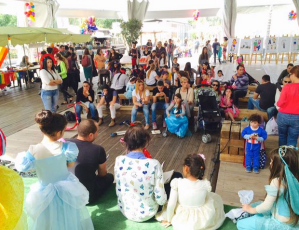On Thursday last week, LGBT families in Israel celebrated the first ever LGBT family event held by Jerusalem’s LGBT community groups. Members of Jerusalem’s LGBT community celebrated a daylong Purim festival called Puriya b’Tachana.
The event, which included arts and crafts projects for children and parents, was promoted as an “LGBTQ-friendly Purim celebration for the whole family.”

The organizers set up a stall of rainbow-themed items; drawing and coloring-in LGBT family illustrations; children’s book readings; a lecture in feminist readings of Megilat Esther; a megila reading; and later in the evening a Purim party.
The event was organized by the LGBTQ Student Association, Women’s Gathering, Havruta, Bat Kol, Jerusalem Open House, Maavarim, Hoshen and Yerushalmiot, and supported by the Ginot Hair Community Council.
Sarah Weil, executive director of the Women’s Gathering community of LGBTQ women, said that the idea for the event emanated from last August’s stabbing attack at the Jerusalem Gay Pride Parade, where an extremist murdered 16-year-old Shira Banki and wounded several others. Weil noted that the attack had shocked the LGBT community, making them realize that the parade was the only LGBT event in Jerusalem each year. “That one time is not enough,” Weil told Jerusalem Post:
“We need visibility throughout the year, we need to come out of our houses and closets and be in the public sphere. “This is our response to stabbing and murder of Shira Banki. We’re going out into the city, we’re not closing ourselves in, we’re not leaving, we’re not cowering in fear, we are trying to really promote the values of tolerance, pluralism, respecting the other and inclusiveness.” Weil said that Purim had been chosen specifically because there are several holiday themes that are pertinent to the gay and trans community.
“Purim is an event which brings people together, symbolizes the concept of ve’nahafoch hu [things turned on their head], ad deloyada [not being able to distinguish between opposite notions], the idea of gender fluidity and transforming our understanding of things and putting them into a different perspective. These are all themes that connected to LGBT experience and identity,” she explained.”
“We’re not here protesting, we’re not here promoting any specific agenda, we’re here as a community, saying we want to be involved in the larger community, we want to be accepted as we are, so the activities we have for kids, the message is inclusiveness and that’s a message that speaks to everyone.”
Noa Sattath, a Reform rabbi attending the event with her partner and three children, said the happening was a “fabulous celebration of diversity and pluralism” and a meaningful experience for her family. “It’s a rare opportunity for us as a family to see ourselves reflected in an event in such a way,” she said.